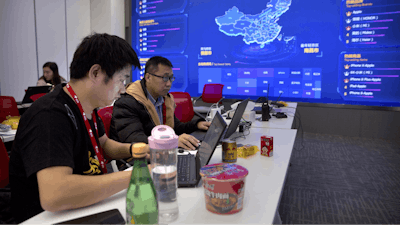
SAN FRANCISCO (AP) — Tech workers in China protesting a corporate culture of grueling work schedules are getting some support from their U.S. peers.
A fast-growing campaign started by Chinese software developers on the code-sharing platform GitHub has contributed to a public debate over work-life balance in China's tech industry.
It's known as 996.ICU, referring to expectations that young people work 12-hour days, six days a week if they want financial success — and the idea that following such an illegal workweek can land them in an intensive care unit.
A group of tech workers at Microsoft, which owns GitHub, distributed an open letter Monday that urges the company to protect the widely shared GitHub page from censorship.
It follows reports that some Chinese domestic web browsers have restricted access to the page.






















